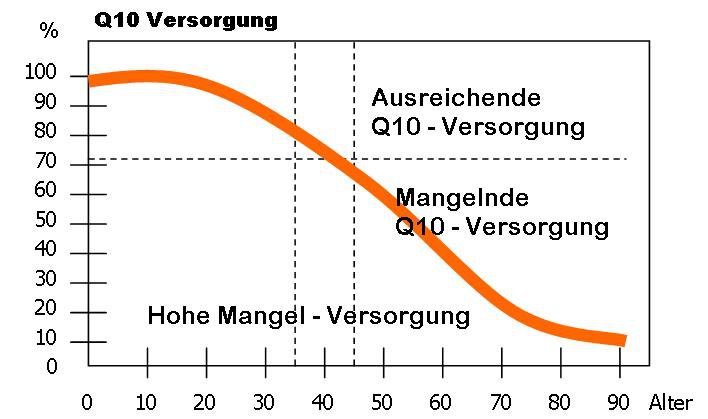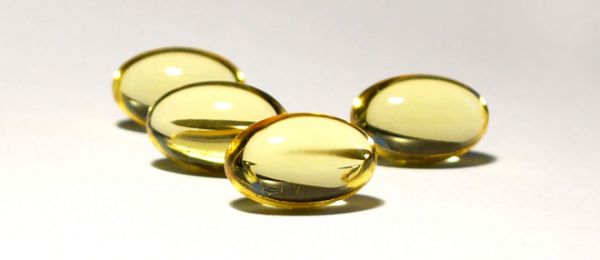Coenzym Q10 (ubiquinone / ubiquinol)
Dr. med. Heinz Lüscher
Many people know the term Q10 from the advertising for anti-aging care products. But it would be a shame to limit Q10 to its effect on the skin. It is basically needed by every cell in our body to ensure energy supply. And it can do even more! So-called ubiquinones occur in the body in two different chemical forms; as ubiquinone and as ubiquinol.
What is Coenzyme Q10?
Coenzyme Q10, also known as Q10, ubiquinone-10 or UQ, is a fat-soluble molecule that is similar in structure to vitamin K and vitamin E. Most people are familiar with Q10 from advertising for anti-aging products, so many think it is just a beauty product. However, it can do much more than ensure a firm skin, which is not bad at all.

Coenzym Q10 in the video
Learn more about Q10 and the vital substances it contains in the video with Dr. Heinz Lüscher.
Cell-Energy
Ubiquinone is a very important endogenous coenzyme that occurs in every cell of the body (ubiquitous = everywhere) and has a decisive influence on the formation of the universal body energy ATP (Adenosine Tri-Phosphate). Q10 is one of the crucial nutrients for energy production in the tiny but powerful mitochondria. These are the power plants that work for us in each and every one of our body cells. In the mitochondria, the energy we consume via carbohydrates, fats or proteins is converted into ATP together with oxygen and the power of water. This process, in which many other enzymes and vital substances are involved, is also called the respiratory chain. Coenzyme Q10 plays an important role in the last step of the respiratory chain. Most Q10 is needed by organs with high energy consumption such as the brain, heart, liver, kidneys, pancreas and, in sports, the muscles. However, Q10 is basically urgently needed by every cell in our body to ensure the energy supply.
But it can do even more!
Main effects of Q10
- Promotes the formation of the cell energy ATP
- Acts antioxidative
- Stabilizes the cell walls
- Stabilizes the walls of the mitochondria
- Strengthens the immune system
- Protects the nerve cells (neuroprotective)
- Protects the heart muscle cells (cardioprotective)
Q10 deficiency
Even a Q10 deficiency of 25% can cause damage to the mitochondria, the tiny cell organelles that produce ATP, which can lead to a noticeable loss of energy. Over the course of a lifetime, the body’s own production steadily decreases. As Q10 deficiency increases, so does the risk of disease. One example is dementia: each brain cell has hundreds to thousands of mitochondria that rely on Q10! The lower the Q10 level, the greater the risk of dementia. Q10 also inhibits inflammation and scavenges free radicals (antioxidant), which is additionally important in the prevention of dementia.
Sources of coenzyme Q10
Q10 is the only fat-soluble antioxidant that can be produced by our body itself. However, this amount is too small, so we have to supplement Q10 with our food. However, there is no food that contains a particularly high amount of Q10, so a balanced diet is crucial. Most Q10 is found in the flesh of organs (e.g. liver), oily fish (e.g. sardines), nuts (e.g. pistachios), pulses, sesame seeds, sunflower seeds, vegetable oils, cabbage, onions, potatoes, spinach, Brussels sprouts and broccoli. However, the coenzyme can be destroyed by boiling. Gentle preparation is therefore important.
When is supplementation with Q10 indicated?
Supplementation can be recommended as a preventive measure from the age of 50, especially if problems with reduced energy are already noticeable or medications are being taken that lower Q10 levels as a side effect. By the way, nobody makes a mistake to be well supplied with Q10. The positive effects on brain and heart function, for example, have been proven. When taking Q10 as a dietary supplement, bioavailability is highest when consuming fats at the same time.
Q10 Predators – drugs
The cholesterol-lowering statins (CSE inhibitors) and beta-blockers considerably reduce the Q10 level as a side effect, in the case of statins it can be over 50%. Tricyclic antidepressants also lower Q10 levels. Anyone who has to take statins because of high cholesterol (note: a level below 7.0 mmol/l is normal and does not need to be treated, a cholesterol level below 5.0 mmol/l is even more dangerous than too high a level!

Are there side effects of coenzyme Q10?
Q10 has no side effects in therapeutic doses up to 2400 mg/day! At even higher doses, which makes no sense therapeutically, diarrhoea and nausea can occur.
What is the difference between ubiquinone and ubiquinol?
More and more often you hear these two almost identical terms and that ubiquinol is “better” than ubiquinone, which not infrequently leads to uncertainty. So-called ubiquinones occur in the body in two different chemical forms; as ubiquinone and as ubiquinol. Ubiquinone is the fully oxidized version. Ubiquinol, on the other hand, is the reduced, or activated, form.
Oxidation is a release of electrons and an increase in the oxidation number, reduction is the acceptance of electrons and a decrease in the oxidation number.
The body can convert ubiquinone into ubiquinol. The advantage of the reduced form (ubiquinol) is that the body is relieved of the task of converting ubiquinone into active ubiquinol. As mentioned above, the concentration of ubiquinones decreases with age, but so does the body’s ability to convert ubiquinone into ubiquinol. Therefore, ubiquinol products make sense especially for older people, but the production of such products is associated with higher costs, which makes them more expensive. Certain preparations also contain ginkgo biloba and ginseng extract, which, among other things, boost memory and contribute to physical and mental performance, which is another plus for an older clientele (but not only!).
Dosage
The dosage naturally depends on the disease and its severity, it is between 100 and 500 mg daily. The capsules are taken throughout the day before meals. A lower dose is sufficient for prophylactic replenishment of the Q10 level and is recommended for 3-6 months.
Recommendations
Products with ubiquinone are often cheaper and show a good effect. Preference should definitely be given to natural products that contain as few additives as possible, and not synthetically produced ones. Liquid ubiquinone in soft gel capsules is also better absorbed in the intestine than powdered ubiquinone. In advanced age, I recommend products with ubiquinol. Some also contain extracts from leaves of the ginkgo tree (Ginkgo biloba), which supports memory. The addition of extracts from ginseng roots increases physical and mental performance. In any case, look for stable Q10 products.
Here is the study:
http://www.ncbi.nlm.nih.gov/pubmed/19284181
Coenzyme Q10 may cause a have a preventive or curative effect
- Chronic fatigue/weariness
- Problems of concentration
- Burnout
- Depression
- Dementia/Alzheimer’s
- Parkinson
- Common infections
- Obesity
- ALS
- Treatment with statins or beta blockers
- Age over 50
- Breast cancer under tamoxifen treatment
- Diabetes
- Chronic inflammation (e.g. arthritis)
- Fertility disorders
- Fibromyalgia
- Cardiovascular diseases
- Migraine
- multiple sclerosis
- Renal insufficiency
- Stress

Further clinical studies
More than 5000 studies about Q10 are published on pubmed.org
The most important ones:
